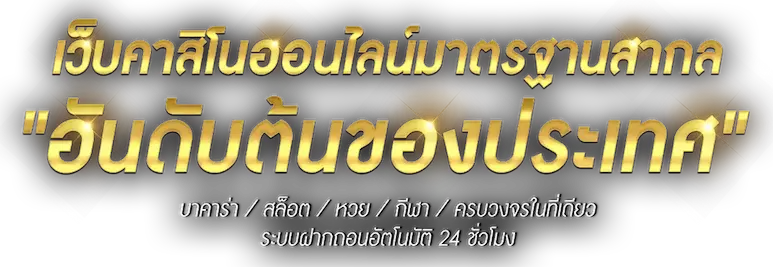
ลาวา123 เลือกเล่นบนเว็บไซต์ที่เชื่อถือได้ มีช่องเว็บไซต์โดยตรง ชนะง่าย อัตราการจ่ายเงินจริง 100% และความมั่นคงทางการเงินสูง นักพนันควรเลือกเว็บไซต์ที่มีประวัติที่ดีและถูกกฎหมาย 100% หากคุณไม่ใช่มือใหม่ในวงการที่เพิ่งหลอกลวงลูกค้าแล้วปิดตัวไป คุณควรเลือกเว็บไซต์ที่ให้บริการฝากและถอนเงินโดยตรง ถอนขั้นต่ำ 1 บาท เสียหายไม่มาก เพิ่มชื่อเสียงของคุณในสล็อต PG
คุณต้องเลือกเกมที่คุณต้องการเล่น เว็บไซต์ของแท้ เว็บไซต์โดยตรง เราจึงต่อต้านเกมสล็อตลิขสิทธิ์แท้ ระบบแท้ จ่ายจริง เลือกเล่นไม่โกง ลงทุนสม่ำเสมอและรับรายได้สม่ำเสมอ มาสร้างกัน แค่มีมือถือก็สามารถสร้างรายได้ได้ตลอดเวลาและกับใครก็ได้ อยู่บ้านก็สร้างรายได้ไม่จำกัด สล็อตไม่มีขั้นต่ำ ลงทุนเพียง 1 บาท รายได้ของคุณจะเพิ่มขึ้นหลายร้อยเท่า เราเป็นทางเลือกที่ดีที่สุดของคุณ สล็อต ฝากถอน true wallet
แหล่งรายได้ที่ดีที่สุดจากเกมสล็อต ตัวเลือกแรกสำหรับเว็บไซต์ ในตอนนี้คือ เว็บเล่นสล็อตออนไลน์ยังไงให้ดีที่สุด และจากเกมสล็อตออนไลน์ก็ควรถือเป็นแหล่งรายได้ นั่นคือสิ่งที่ฉันชอบ ดีที่สุดเท่าที่เคยมีมา มีนักพนันที่เข้าร่วมเป็นสมาชิกของเว็บไซต์นี้ อย่าลืมวางเดิมพันในเกมสล็อตออนไลน์ หลายคนได้รับเงินก้อนโตแล้ว หากคุณเป็นคนที่หลงใหลในการเล่นเกมสล็อตอย่าพลาดเด็ดขาด
โอกาสในการชนะรางวัลใหญ่จากการเล่นเกมสล็อตนั้นมีมาก อยู่ไม่ไกลหลัง ตัวเลือกที่ทำกำไรได้ที่ต้องระวังในปี 2024 หากคุณต้องการตัวเลือกในการสร้างรายได้เพิ่มเติม กำไรจากการพนันที่คุ้มค่าที่สุด เราขอแนะนำให้คุณเป็นสมาชิกของ pg slot เว็บไซต์ตรงยอดนิยมที่ให้บริการเกมสล็อตโดยไม่ต้องผ่านตัวแทนหรือคนกลาง ปัจจุบันเป็นวิธีหาเงินยอดนิยม ใครๆ ก็สามารถเข้าร่วมเล่นเกมสล็อต ทำกำไร และรับผลตอบแทนมหาศาลได้อย่างง่ายดาย สล็อต 123 เว็บตรง

ลาวา123 บอกเลยว่าทุกคนไม่ควรพลาดการเล่นเกมสล็อตออนไลน์ที่มีเอกลักษณ์และตรงไปตรงมาของเราอย่างแน่นอน เว็บไซต์สล็อตออนไลน์ของเรามีเทคโนโลยีที่ทันสมัยที่สุด รับรองว่าทุกคนจะได้เจอกัน ระบบปฏิบัติการที่ทันสมัยที่สุดที่มีอยู่ในปัจจุบัน หากคุณลงทะเบียนกับเรา ไม่ใช่ทุกคนที่จะพบกับความล้าสมัยแม้แต่น้อย เพราะเราอัพเดตระบบทุกเดือน และมันจะช่วยให้คุณเล่นเกมสล็อตได้ลื่นไหลไม่มีสะดุด ช่วยให้คุณมีรายได้เพิ่มมากขึ้น เพราะเว็บสล็อตของเรามีระบบปฏิบัติการที่เสถียรที่สุด เรารับรองว่าทุกคนจะสนุกไปกับระบบนี้ ดวง ดี สล็อต 123
มีความเสถียรมากกว่าเว็บสล็อตออนไลน์อื่นๆมาก คุณจะสามารถเล่นสล็อตออนไลน์ได้โดยตรง สล็อตเป็นสล็อตออนไลน์ที่สามารถเล่นผ่าน API เว็บของเซิร์ฟเวอร์แบ็กเอนด์ ไม่มีระบบกลาง ไม่มีตัวแทน ไม่มีช่องทางตัวแทนโดยตรง บนเว็บไซต์คุณจะพบกับเกมที่มีชื่อเสียงที่สุด สล็อต PG ของแท้ สล็อต PG และเว็บไซต์ถ่ายทอดสดเป็นตัวเลือกที่น่าสนใจสำหรับผู้ที่รักความสนุกสนานและความตื่นเต้นในการเล่นสล็อตออนไลน์ ไม่ว่าคุณจะเป็นผู้เล่นมืออาชีพหรือมือใหม่ สล็อต เว็บไหนดี แตกง่าย
จะทำให้คุณติดใจและให้โอกาสคุณลุ้นรางวัลใหญ่ ลองออนไลน์และสนุกไปกับโลกของเครื่องสล็อต สิ่งนี้จะเพิ่มโอกาสในการชนะ ลงทะเบียนเพื่อรับกระเป๋าเงินของคุณเมื่อคุณหมุนวงล้อสล็อต PG เพื่อรับรางวัลใหญ่ทุกที่ นอกจากนี้ยังมีระดับผู้เล่นที่ให้คุณได้รับคะแนนจากการเล่นเกม สิ่งนี้จะเพิ่มโอกาสในการรับข้อเสนอพิเศษและโบนัสจากเกมสล็อต PG ล่าสุดเข้าถึงกระเป๋าเงิน PG Slots ของคุณ เข้าถึงสล็อตออนไลน์หรือบาคาร่าออนไลน์ได้แล้ววันนี้ สล็อตออนไลน์สามารถเข้าถึงได้มากขึ้นกว่าเดิม เว็บไซต์โดยตรง PG SLOT SLOTS ความละเอียดของเกมสล็อตเว็บไซต์โดยตรงช่วยให้ผู้เล่นเพลิดเพลินกับกราฟิกที่น่าทึ่งและสีสันที่น่าทึ่ง สล็อต 123 เว็บตรง
เว็บพนันออนไลน์ที่ถูกพูดถึงมากที่สุดดังแสดงตามรีวิวหรือจำนวนคนค้นหาบน Google ซึ่งทำให้เว็บ pg slot ของเราไม่มีขั้นต่ำมีคนเข้าใช้งานมากขึ้นเรื่อยๆ เว็บไซต์เกมออนไลน์อื่น ๆ ที่คุณสามารถเล่นได้ คาสิโนออนไลน์มีทุกรูปแบบไม่ว่าจะเป็น แทงบอล บาคาร่า สล็อต หรือแม้แต่แทงมวยเราเสนอโปรโมชั่นพร้อมค่าคอมมิชชั่นสูงถึง 0.5% ดังนั้นคุณจึงมั่นใจได้ว่าคุณจะได้รับมากกว่าใครๆ เป็นเว็บไซต์ใหม่ที่ได้รับความนิยมมากกว่าเว็บไซต์อื่นในขณะนี้ เข้าใจง่ายและตัวอักษรมีความชัดเจน รองรับหลายภาษารวมทั้งภาษาไทยด้วย มีกีฬาที่เรียบง่ายและไร้ความเครียดให้เลือกมากมาย 123 สล็อตเว็บตรง
เว็บไซต์พนันออนไลน์ pg ที่ดีที่สุดและได้รับความนิยมมากที่สุดในประเทศไทย นี่คือเว็บไซต์ที่มีระบบครบวงจรที่สุดและได้รับความไว้วางใจจากผู้เล่นชาวไทย และต่างประเทศ หากคุณกำลังมองหาเว็บไซต์สล็อต pg ไม่มีขั้นต่ำ นี่คือคำตอบของคุณอย่างแน่นอน เว็บไซต์ที่ใครๆ ก็ถือว่าเป็นเว็บไซต์พนันออนไลน์ที่ดีที่สุดและเสถียรที่สุด PG Slots ไม่มีขั้นต่ำและรับประกันการโอนเงินที่รวดเร็ว การชำระเงินที่ปลอดภัย 100% และระบบเสนอค่าคอมมิชชั่นสูงสุด ลาวา123
เรานำเสนอเว็บไซต์การพนันออนไลน์และเว็บไซต์สล็อตโดยตรง คุณควรเลือกเล่นกับเว็บไซต์สล็อตใหม่ล่าสุดเป็นเว็บไซต์ตรงที่คุณสามารถค้นหาและเล่นได้อย่างง่ายดาย หากคุณกำลังมองหาเกมหรือชื่อสล็อตที่ง่ายต่อการถอดรหัส คุณจะพบเว็บไซต์ มากมายที่คุณสามารถเลือกสิ่งที่คุณต้องการเล่นได้ แต่ในความเป็นจริงแล้ว เว็บไซต์ส่วนใหญ่ไม่ได้มาตรฐาน เพื่อให้สามารถเปิดบริการได้อย่างเสถียร ดังนั้นในปัจจุบันจึงมีกลโกงมากมาย เลือกหมุนสล็อตอย่างปลอดภัยกับเราเพื่อให้คุณเดิมพันได้อย่างมั่นใจ เราจึงอยากแนะนำให้คุณรู้จักกับ คุณจะไม่พลาดการลงทุนกับ PG Slots ซึ่งเป็นเว็บไซต์ตรงที่ได้รับความนิยมอย่างมาก สล็อต เว็บไหนดี แตกง่าย
ด้วยเกมสล็อตที่ส่งตรงถึงเว็บไซต์ไม่ต้องฝากหรือถอนเงินและถอนเงินเริ่มต้นเพียง 1 บาท คุณจะได้รับประสบการณ์ที่ดีกว่าที่อื่นอย่างแท้จริง นอกจากนี้เนื่องจากเราเป็นเว็บไซต์โดยตรง เราจึงมีมาตรฐานเพียงพอ เราจะพยายามปรับปรุงระบบเสมอหากมีปัญหาใดๆ
เว็บสล็อตทันสมัย เว็บตรง แตกง่าย พร้อมบริการมากกว่าที่อื่น พร้อมสร้างกำไรจากการเล่นให้ทุกคนมั่นใจด้วยการลงทุนในการเล่นสล็อตออนไลน์ของเรา เงินของคุณจะถูกเก็บไว้อย่างปลอดภัย และเมื่อถึงเวลาถอน ระบบอัตโนมัติของเรา ฝากและถอนเงินทันทีภายในเวลาไม่ถึง 30 วินาที ทำให้เรากลายเป็นเว็บไซต์สล็อตที่ได้รับความนิยมมากที่สุด เป็นไปตามมาตรฐานสากลที่ทุกประเทศยอมรับและปลอดภัย 100% สล็อต โจ๊ก เกอร์ 123 เว็บตรง
การฝาก/ถอนขั้นต่ำ แนะนำระบบอัตโนมัติที่ให้การฝากและถอนเงินล่วงหน้าที่มีประสิทธิภาพและรวดเร็ว ประสิทธิภาพสูง ทำให้สะดวกแก่สมาชิก เพิ่มการฝากและถอนเงิน เว็บไซต์พนันสล็อต ที่ได้รับความนิยมสูงสุด ผู้ใช้คนเดียวสามารถเล่นเกมกับผู้ให้บริการเกมใดก็ได้ เข้าถึงการเล่นเกมที่ล้ำสมัยและระบบฝาก/ถอนเงินอัตโนมัติ ฝาก/ถอนไม่มีขั้นต่ำ สล็อต โจ๊ก เกอร์ 123 เว็บตรง
สล็อตนั้นง่ายต่อการถอดรหัส ให้เงินจริง และการจ่ายเงินไม่จำกัด โปรโมชั่นสล็อต ที่ดีที่สุดในแผ่นดิน สามารถกดรับโปรโมชั่นได้ ในหน้าเว็บไซต์เอง คุณสามารถคลิก “ฝาก” หรือ “ถอน” ได้ทันทีในเวลาเพียง 30 วินาทีและรับประโยชน์จากสิทธิพิเศษมากมาย กับเว็บไซต์ที่มาแรงที่สุดในขณะนี้ เราให้มากกว่าแค่การเล่นสล็อต ลาวา123
ทำธุรกรรมง่าย เล่นง่าย บนโทรศัพท์มือถือส่วนตัวของคุณ เล่นสล็อตออนไลน์ได้ทันทีหรือบนคอมพิวเตอร์ของคุณ คุณก็ทำได้เช่นกัน มันใช้งานได้จริงและง่ายมาก เล่นง่ายด้วยระบบที่ดีที่สุด ฝากถอน รวดเร็วภายใน 30 วินาที เงินจะเข้าบัญชีของคุณทันที สะดวกและรวดเร็วกว่าธนาคาร

ลาวา123 ผู้ให้บริการเว็บไซต์สล็อตโดยตรง 100% แตกง่าย สมัครง่าย รวดเร็ว เว็บไซต์มีเกมการพนันมากมาย เว็บไซต์โดยตรงสำหรับการฝากและถอนเงินโดยไม่มีขั้นต่ำ นอกจากนี้ยังมีโปรโมชั่น และโบนัสสำหรับผู้เล่นเพื่อใช้ประโยชน์จากเกมสล็อตอย่างมืออาชีพ PG Slots เว็บถ่ายทอดสดทุกวันที่นี่ที่เดียวไม่ยุ่งยาก พร้อมทำงานเป็นเว็บสล็อตสดโดยไม่ต้องผ่านตัวแทน อย่างน้อยเราก็เป็นเว็บสล็อตออนไลน์ที่มีแบรนด์ระดับสากลจากต่างประเทศเพราะเราคือ PG Slots
เว็บไซต์นี้นำเสนอเกมสล็อตยอดนิยม สล็อตเครดิตฟรี คัดสรรเกมสล็อตยอดนิยมที่รวบรวมเกมสล็อตยอดนิยมที่สร้างความสนุกสนานมากมายให้กับนักพนัน มาเล่นและรับเงินง่ายๆ และรับสิทธิ์ลุ้นเงินจริง รับรางวัลไม่จำกัด รับอัตราการจ่ายสูง มั่นใจได้ว่าเว็บสล็อตออนไลน์ เว็บสล็อตสด ขั้นต่ำ 1 บาท จะตอบโจทย์ความต้องการของคุณได้เป็นอย่างดีและสร้างรายได้มหาศาลให้กับตัวคุณเองโดยที่คุณไม่รู้ตัว ดังนั้นนักพนันส่วนใหญ่จึงค่อนข้างรวย มีเว็บไซต์มากมายที่เป็นที่สนใจของนักพนัน และเล่นด้วยความมั่นใจ 123 สล็อตเว็บตรง
เพื่อให้เพื่อนๆสามารถเล่นสล็อตออนไลน์กับค่ายเกมได้ เว็บไซต์สล็อตโดยตรงไม่ผ่านตัวแทน ไซต์สล็อตใหม่ล่าสุดเป็นไซต์ PG โดยตรง ซึ่งหมายความว่าคุณไม่จำเป็นต้องเล่นสล็อตออนไลน์ผ่านตัวแทนและตัวแทนอีกต่อไป คุณสามารถเล่นสล็อตออนไลน์ได้ทันทีตลอด 24 ชั่วโมง คุณสามารถทำเงินได้ทุกที่ที่คุณต้องการผ่านสล็อตบนมือถือซึ่งเป็นเกมสล็อตที่เล่นง่าย สล็อต โจ๊ก เกอร์ 123 เว็บตรง
ลาวา123 พร้อมให้บริการทุกวันตลอด 24 ชั่วโมง ด้วยระบบที่เป็นระเบียบ เจ๋งมาก. เล่นง่าย ชนะโบนัสง่าย ชนะบ่อยที่สุด การเข้าถึงเกมและการเดิมพันทำได้โดยตรงผ่านเว็บไซต์ ไม่ผ่านตัวแทน ชิงเงินรางวัล เข้าถึงสล็อตออนไลน์คุณภาพสูงของเราอย่างต่อเนื่องทุกวัน เว็บไซต์สล็อตออนไลน์ พร้อมโบนัสก้อนใหญ่ที่สามารถเล่นออนไลน์และพร้อมทำธุรกรรมให้คุณได้ตลอดเวลา